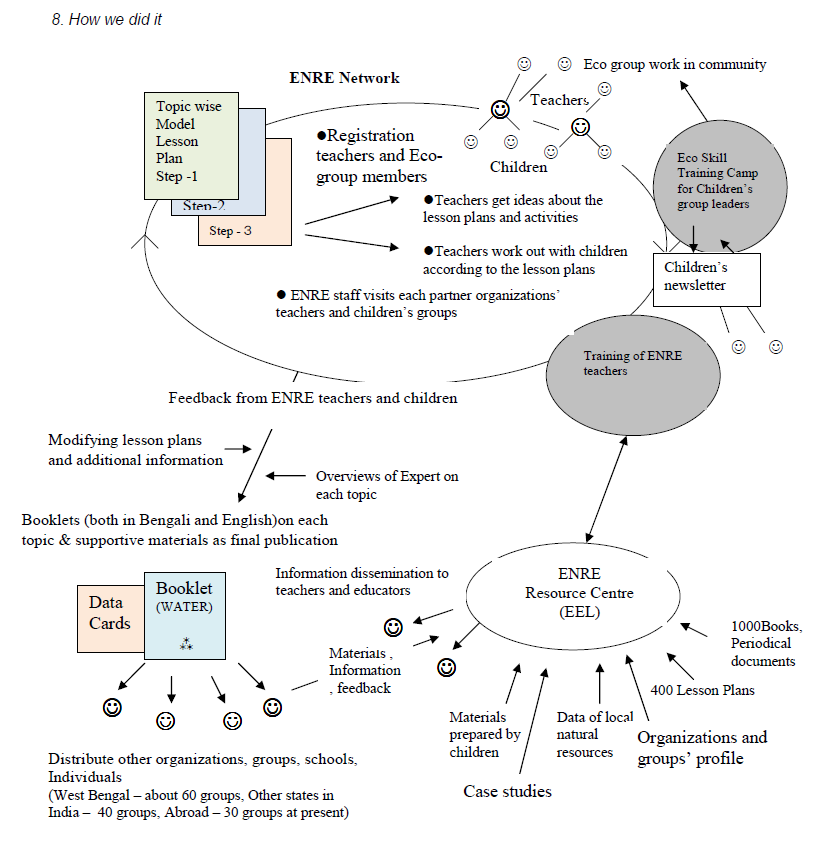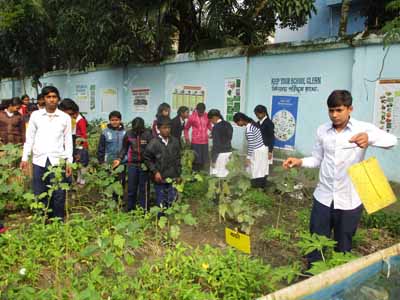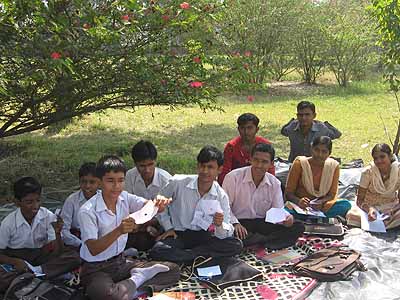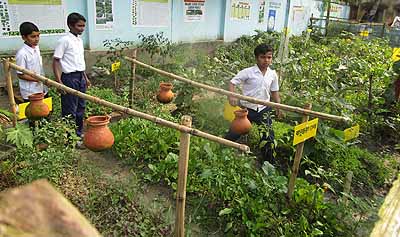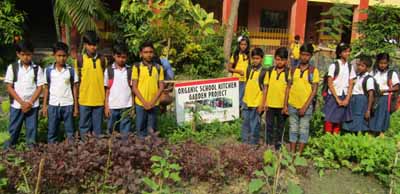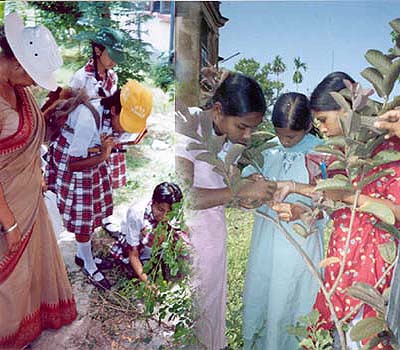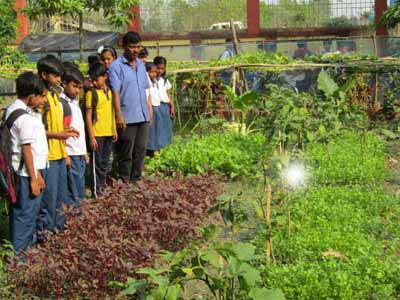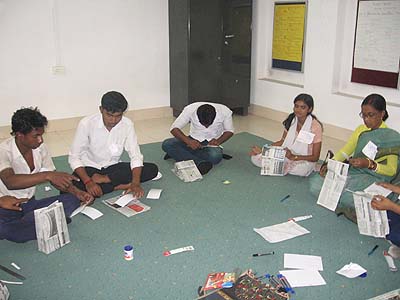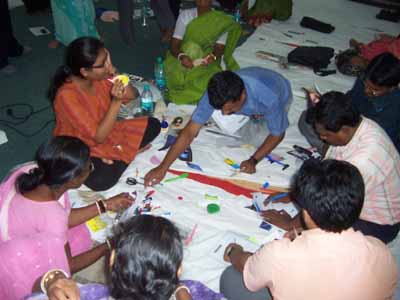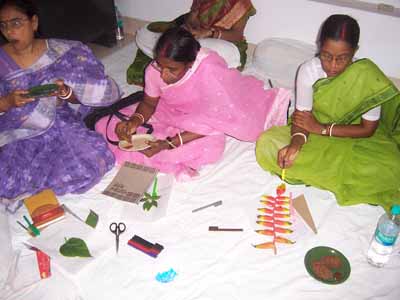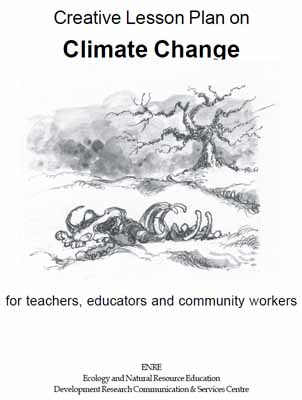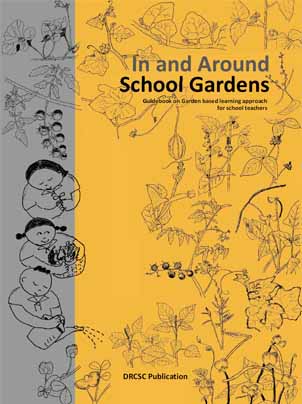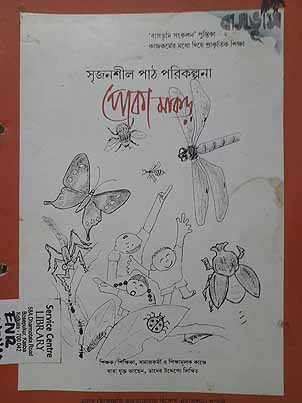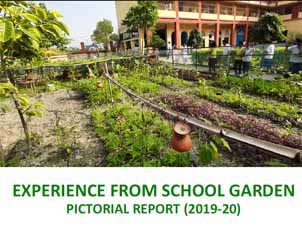Pretext
It is our responsibility to save our environment, nature, biodiversity, ecological resources from getting destroyed. That is why, now it has become essential to do some hands on activities apart from studying environment in order to make the saving nature faster and practical based. We can use the school syllabus to make the nature-based learning tools for doing such activities. To make the future generation more responsible and conscious towards nature and ecology, they need to be skill up in a more serious and practical way. This is needed because the children must know how they can work individually or in a group to collect different information, analyse , present and make small experiments in order to save nature.
Education, especially science education, brought down to chalk duster oriented rote learning and memorizing. Very minimum amount experimentation is practiced. It is far away from our day to day living. It became only information and knowledge based with thin linkages with skills like observation, data collection, analysis and communication skill.
Environment education has no connection with understanding and respect on the interconnectivity of human & nature, it has only reference to some mega issues like ozone hole, global worming & polar bear and names of birds and trees.
Initiatives in formal sector in the form of eco-clubs in each an every school and introducing environment science as a subject in curriculum to spread the awareness for protecting environment has come down to an orthodox text book and examination oriented cliched practice.
What we tried
Form network with schools, grass root NGOs involved in education and environment protection activities. Train up educators, teachers and social workers with various tools and concepts of group activity based, experiential, learner centric, reflective education, especially for application in the field of environment education.
Village centric eco groups try to assess local ecological resources and related problems, participating in group based action research and awareness building on socio-ecological issues through regular activities and peer sharing.
Basic scientific skills and understanding of various tools for observation, data collection & collation and communication are inculcated through this.
Regular classes with the mainstream schools to generate sufficient interest in favour of protecting and nurturing nature and develop out alternative group based activity based transactional method.
Raising school garden and promoting garden based learning.
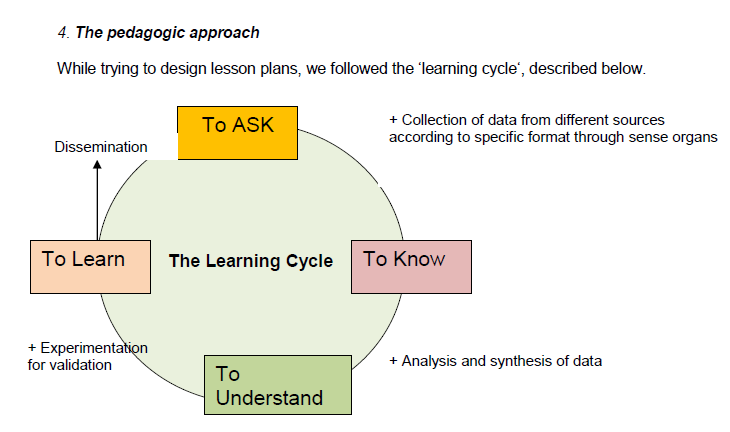
Step -1
So, to learn, you have to understand, to understand - you have to know, and to know, you have to ask questions. Man is ever inquisitive, especially when in their early ages. The questions that are asked in those are the father of science and philosophy. The cycle of learning begins from asking question. The process of learning triggered when a question comes in one's mind. Our effort is to begin with such activities, which will nourish the skill of asking questions. So that instead of memorizing without and reproducing, students will ask question and can verify what they are taught in school. Not just the 'what' type question, but the real questions - 'why' and 'how'.
Step -2
Then comes finding out the answer or searching out for information. It is easier if we frame the questions properly or breaking down the question in to smaller one. What could be the sources of information?
 Secondary sources, like, books/ websites/ encyclopedia/ television/ radio etc. This requires some special skill.
Secondary sources, like, books/ websites/ encyclopedia/ television/ radio etc. This requires some special skill.
 Interview with special expertise in the related field. Then we need to know how to set questions, how to design format and how to take interviews
Interview with special expertise in the related field. Then we need to know how to set questions, how to design format and how to take interviews
 We need to find out some answers ourselves. Collecting information is all about efficient usage of our five sense organs. We need to use those to full extent. There are different tools on collecting information like Time Line, Brain Storming, Base Map, Resource Map, Mobility Map, Seasonal Calendar, and Exit-Entry Survey etc. These are commonly known as Participatory Resource Appraisal tools. When these are taught, children can use them very efficiently. While using these tools, child's observation skill, sense of direction and mapping will be developed, which will help them in regular studies also.
We need to find out some answers ourselves. Collecting information is all about efficient usage of our five sense organs. We need to use those to full extent. There are different tools on collecting information like Time Line, Brain Storming, Base Map, Resource Map, Mobility Map, Seasonal Calendar, and Exit-Entry Survey etc. These are commonly known as Participatory Resource Appraisal tools. When these are taught, children can use them very efficiently. While using these tools, child's observation skill, sense of direction and mapping will be developed, which will help them in regular studies also.
Step -3
After collecting information, we may say, we 'know' the content of the answer. But if we want to take it to the 'understanding' level, we have to summarize, analyse or synthesize the collected information, which will help us to reach the conclusion. There are different tools of analysis, like diagnosis, Pattern analysis, Cause-effect relation, Comparison, Flow chart, Social Map, Tally, Ranking, Line graph, Bar chart, Pie diagram, Transect mapping, Venn diagram etc. These are also very well known tools. Practicing these will help the children to have ideas about unit, measurement, visual representation of data and mathematics.
Step -4
We always say that learning should be experiential. So verification of the result is the final part of the process. Then we come to a stage where we can teach others also. Setting up an experiment to verify anything is the inherent skill associated with this step.
Step -5
Knowledge is nothing if you don't share it with others. So it is absolute essential developing communication skills of the children to present the result before community through Chart, Poster, Drama, Puppetry, Exhibition etc. This will boost up their creative skill also.
6. Some in-depth study done by the senior children/youth
- Comparative trial of organic and inorganic fertilizer on brinjal and chili
- Raising beetle vine by organic method and comparing it with the common method
- Compost making from water hyacinth with other available components
- Documentation on belief & superstition, trying to find out scientific root
- Raising herbal medicine garden
- Documentation of pests attack on a kitchen garden and controlling it by home made pest repellents
- Documentation of collected food items in the villages
- Documentation on killing bird and campaigning against it
- Domestic organic waste and its use
- Doing Biodiversity registrar in 20 villages and hand over to local Panchayet for using it in the village planning
7. Senior children are running 10 eco-resource centre with
- local socio-ecological data
- demonstration unit and training facilities of compost, Vermicompost, kitchen garden, bio-pest repellents, hand made paper, herbal medicine, book binding etc
- Helping local school children to do EVS projects
- Library with newspaper cuttings etc
9. Some components
- Teachers' workshop
- Child camp on eco-skills like nursery raising, composting, herbal medicine, solar cooker making etc
- Nature study camp
- Puppetry and theatre workshop
- Workshop on making crafts from waste
- Eco work exhibition
10. The Span
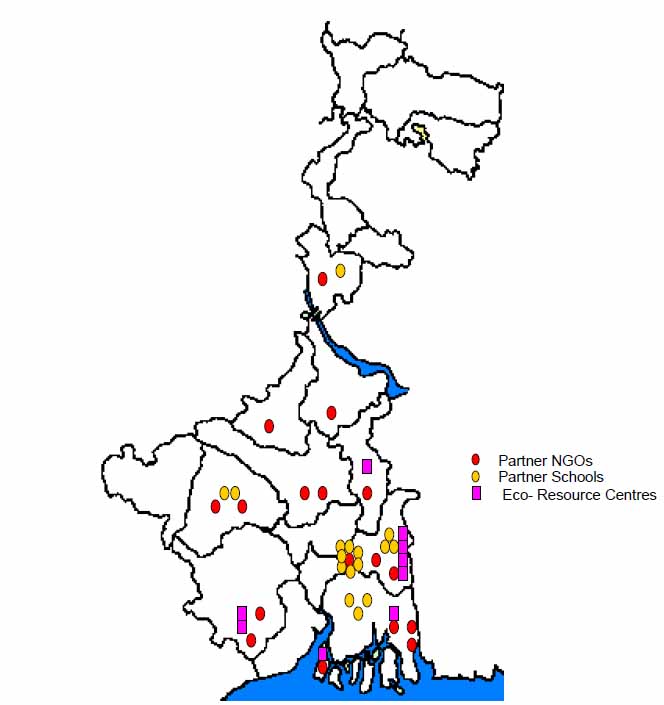
- Over 2500 children and 50 educators from 10 districts of West Bengal in the network.
- 17 Partner NGOs
- 16 Schools
- Funding support from AEON (Japan), Christian Aid (UK), NCSTC (Govt. of India), Shaplaneer (Japan) - continuing, Indienhilfe (Germany) - continuing.
11. Output
- Creative lesson plan series on Tree, Insect, Medicinal Plant, Water, Rice, Bird, Fish, Vegetable, Waste, Energy and Local Market - are essentially a series for the teacher and educators with the compiled work of the children. Can readily be used with the children.
- A teacher's guidebook on EVS for class VI-VIII with worksheet, projects, home work and alternative text.
- 'Kaktarua (Scare crow)', a quarterly magazine with children's work.
- Detailed biodiversity register of 20 villages.
- Research papers mentioned in 6.
- Design of school garden and school garden based lesson plans.
- A resource material kit on Social Insect with a film, poster, calendar, workbook and teacher's manual.
- Booklet series: Science around us (Kitchen, Garden, Chemicals we use, Communication, Construction)
- Innumerous numbers of chart and poster designed and generated by the children.
- A bunch of dedicated youth and children environment protectors with wonderful scientific and communication skill
- A bunch of teachers and educators who know the methods and can act as resource persons
- 10 eco resource centres.
- 12 School gardens.


 Secondary sources, like, books/ websites/ encyclopedia/ television/ radio etc. This requires some special skill.
Secondary sources, like, books/ websites/ encyclopedia/ television/ radio etc. This requires some special skill.
 Tree
Tree 





